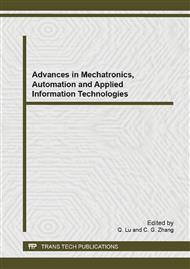[1]
Mansour, E. & Hopfner, H. Replay the execution history of rule-based information. In Proceedings of the 1st International Conference on Advances in Databases, (2009).
Google Scholar
[2]
Wu, B., Dube, K. & Mansour, E. The Motion Picture Paradigm for Managing Information - A Framework and Approach to Supporting the Play and Replay of Information in Computerized Information Systems. In ICEIS (1). (2008).
DOI: 10.5220/0001715305150518
Google Scholar
[3]
Wu, B. & Dube, K. PLAN: a framework and specification language with an event-condition-action (ECA) mechanism for clinical test request protocols., Proceedings of the 34th Annual Hawaii International Conference on System Sciences. (2001).
DOI: 10.1109/hicss.2001.926554
Google Scholar
[4]
Zhou, E., Wu, B., Ding, Y. & Wu, J. Coins: A modeling approach for recording & replaying complex information. The IADIS International Conference Information Systems. (2011).
Google Scholar
[5]
Erqiang Zhou and Bing Wu. Enhancing system usability with a natural language interface. The Third International Conference on Intelligent Human Computer Interaction, (2011).
Google Scholar
[6]
Jarke, M. & Klamma, R. Metadata and cooperative knowledge management. Advanced Information Systems Engineering, Lecture Notes in Computer Science, Berlin: Springer. 2006(2348)4-20.
Google Scholar
[7]
Rosson, M.B. & Carroll, J.M. Scenario-based design. Human-Computer Interaction: Development Process, CRC Press. 2009. 146-161.
Google Scholar
[8]
Damas, C., Lambeau, B. & van Lamsweerde, A. Scenarios, goals, and state machines: a win-win partnership for model synthesis. Proceedings of the 14th ACM SIGSOFT international symposium on Foundations of software engineering. (2006).
DOI: 10.1145/1181775.1181800
Google Scholar
[9]
Alspaugh, T.A. & Anton, A.I. Scenario support for effective requirements. Information and Software Technology. 2008(50) 198-220.
DOI: 10.1016/j.infsof.2006.12.003
Google Scholar
[10]
Kim, S., Kim, M. & Park, S. Service identification using goal and scenario in service oriented architecture. In Proceedings of the 15th Asia-Pacific Software Engineering Conference. (2008).
DOI: 10.1109/apsec.2008.31
Google Scholar
[11]
Hsu, S. & Chang, J. (2009). Developing a scenario database for product innovation. Human Centered Design, Lecture Notes in Computer Science, Berlin Springer. 2009(5619) 585-593.
DOI: 10.1007/978-3-642-02806-9_68
Google Scholar
[12]
Mahmoud, M and so on. A formal framework for scenario development in support of environmental decision-making. Environmental Modelling & Software. 2009(24) 798-808.
Google Scholar


